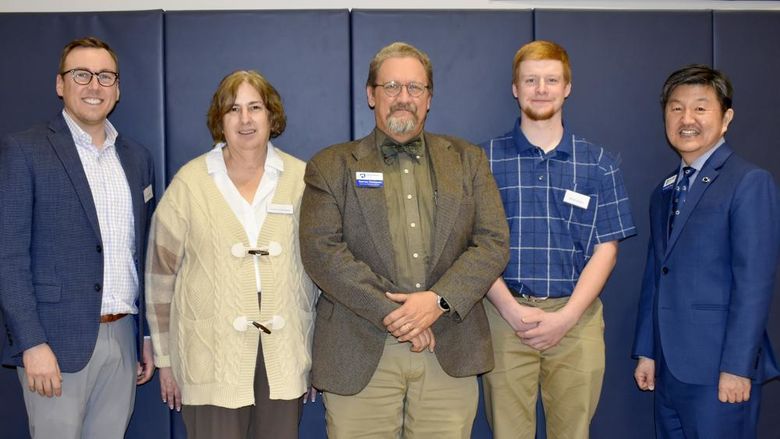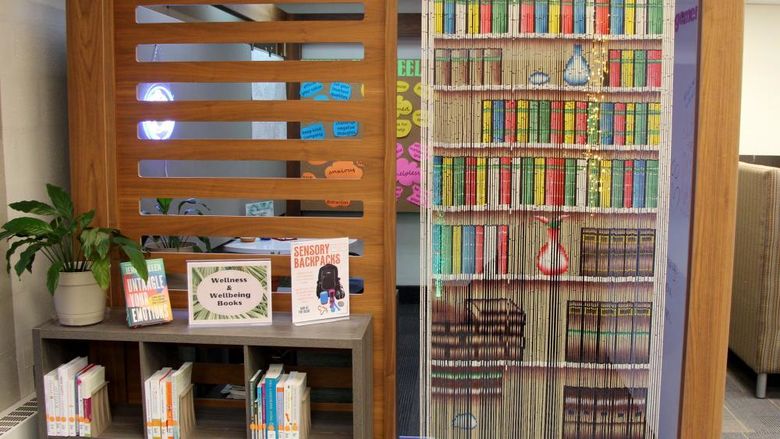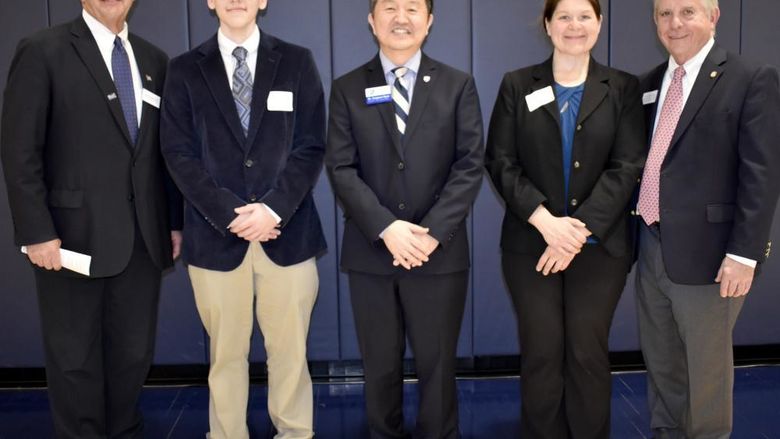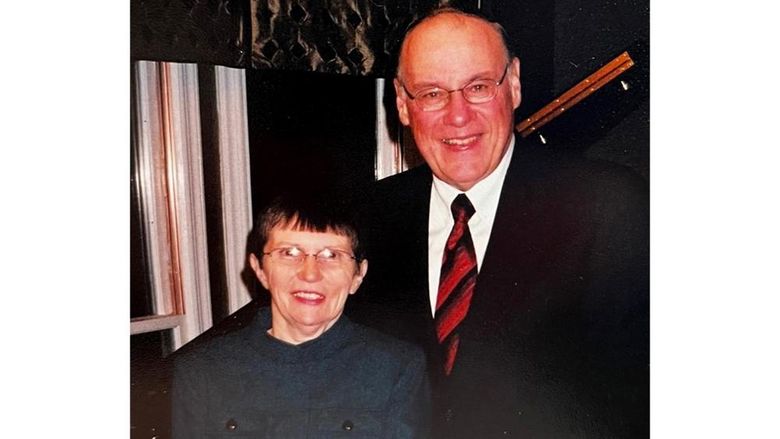
Front to back, student Cory Jamieson, Research Technician Glenn Rishel, and Assistant Professor of Engineering Daudi Waryoba examine the composition of powder metal samples under the new scanning electronic microscope.
DUBOIS, Pa. — Thanks to a gift from a generous donor, Penn State DuBois engineering students and faculty have another way to distinguish themselves as members of an outstanding program. A new scanning electronic microscope, now housed in the engineering labs, is available, meeting a variety of needs, and bringing some research capabilities in line with labs at University Park.
The microscope is utilized by faculty as a valuable instructional tool, with which they can train students on equipment they'll go on to use in their careers. It will also be available to students conducting research projects as part of their academics. Additionally, industry partners at local manufacturing facilities will be able to use the microscope in researching their own methods to improve production.
The Jeol JSM – 7200F is among the very latest and most advanced scanning electronic microscopes available. It is capable of magnification of up to one million times an object's actual size, almost instantly. By way of comparison, the old microscope this one replaces was capable of magnification of 200,000 times, and required hours of processing to produce images.
"I'm just speechless at its capabilities compared to the old one. I don't know where to begin," said Research Technician Glenn Rishel.
The microscope is a valuable tool in discovering the composition of materials, such as powder metal. Understanding the makeup of such materials can tell engineers how they can improve the material, making it stronger, or even which materials work best for producing which products. Powder metal products are used as components in things most people use every day, such as cars and home appliances.
Valued at nearly $300,000, the purchase of this microscope was made possible by donor support such as the lead gift of $200,000 by Charles Snapp, Penn State class of 1963. The remainder was covered through unrestricted contributions from additional donors. Snapp is a campus alumnus and long-time supporter who has established multiple scholarship funds throughout the years, and was enthusiastic about finding a new and different way to give back to the campus.
"Everything that I've given to Penn State DuBois over many years was given in gratitude to the campus where the first and biggest step in my life's long journey took place," Snapp said. "As to why I chose to fund the scanning electronic microscope project, I wanted to do something for the campus that benefited a larger group of students. The scholarships that I've funded benefited individual students. The microscope was something that I saw benefited a larger population of students. This is something that students majoring in engineering, wildlife technology and possibly other majors could benefit from. Not only that, the microscope could be available to private industry in the area.
"The bottom line on this project is that I foresaw this as something that made the DuBois campus a more attractive and valuable asset to have in Northcentral Pennsylvania. I support the campus, in part, because my involvement with the DuBois Campus has been one of great satisfaction. I've met many people on the faculty and staff, students, friends of the campus and people in private industry during my visits to the campus. The entire experience is one that I treasure," said Snapp.
Cory Jamieson is one student who is already benefiting from the gift. The senior engineering student from Punxsutawney is using the microscope on a project where he is researching the composition of powder metal. Jamieson said, "This is my senior project, and I have applied to a graduate program. This is definitely great to have here. Before, I had to travel to University Park to use that equipment there. It's so convenient to have this at DuBois. At University Park, the labs are really busy; I had to schedule time on equipment a week in advance, and then I would have limited time to be able to use it. Here, I can just come in and see if it's available and use it."
Assistant Professor of Engineering Daudi Waryoba echoed Jamieson's comments.
"This gives opportunity to students to use the equipment for research projects, and that opportunity is unbelievable. Before we would schedule a day for labs to take a group of students to University Park. We would schedule two weeks ahead of time just to get some time to teach the students how to use it," said Waryoba. "Now, I can be doing a lecture and have this right here to show them what I'm talking about. Now, they can have access to be able to complete an actual project."
Professionals in the local manufacturing field are also excited to have this microscope available to them. Several companies have already visited the campus labs to use the microscopes for their own research; among them is Abbot Furnace.
"Having access to the SEM at Penn State DuBois is a great asset to our local industry," said Daniel Reardon, director of technical sales at Abbott Furnace. "It really helps to identify issues and solve problems quickly. Without it, the timetable to get resolution to the problem would be extended and costs would certainly increase."
Graduates of two- and four-year engineering programs at Penn State DuBois learn the skills that are in demand in a variety of industries, including powder metal, design, research and development, experimentation and testing, manufacturing and more.
Gifts from Penn State's alumni and friends have been essential to the success of the University's historic land-grant mission to serve the public good. To fulfill that mission for a new era of rapid change and global connections, the University has begun "A Greater Penn State for 21st Century Excellence," a fast-paced campaign focused on the three key imperatives of a public university: Private support will keep the doors to higher education open to hard-working students regardless of financial well-being; create transformative experiences that go beyond the classroom; and impact the world by fueling discovery, innovation and entrepreneurship. To learn more, visit greaterpennstate.psu.edu.





